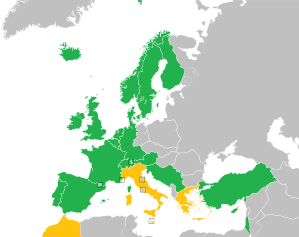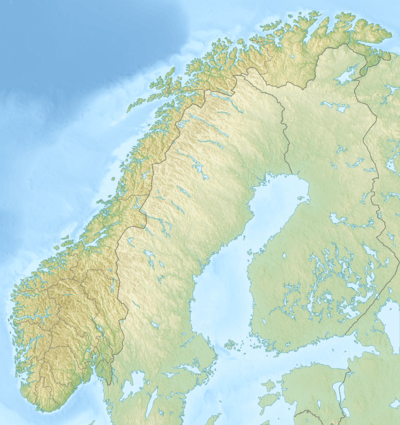Eurovision Song Contest 1986
The Eurovision Song Contest 1986 was the 31st Eurovision Song Contest and was held on 3 May 1986 in Grieghallen in Bergen, Norway. It was the first occasion on which Norway played host to the contest. The presenter was Åse Kleveland, a well-known folk guitarist who was President of the Norwegian Association of Musicians (and a former Eurovision entrant, in 1966).
| Eurovision Song Contest 1986 | |
|---|---|
 | |
| Dates | |
| Final | 3 May 1986 |
| Host | |
| Venue | Grieghallen Bergen, Norway |
| Presenter(s) | Åse Kleveland |
| Conductor | Egil Monn-Iversen |
| Directed by | John Andreassen |
| Executive supervisor | Frank Naef |
| Host broadcaster | Norsk rikskringkasting (NRK) |
| Opening act | "Welcome to Music" performed by Åse Kleveland |
| Interval act | "Bergensiana" performed by Sissel Kyrkjebø and Steinar Ofsdal |
| Website | eurovision |
| Participants | |
| Number of entries | 20 |
| Debuting countries | |
| Returning countries | |
| Non-returning countries | |
Participation map
| |
| Vote | |
| Voting system | Each country awarded 12, 10, 8-1 point(s) to their 10 favourite songs |
| Nul points | None |
| Winning song | "J'aime la vie" |
The 1986 contest was a first for Eurovision in that royalty were among the guests—Crown Prince Harald, Crown Princess Sonja, Princess Märtha Louise and Prince Haakon Magnus were all in attendance.
Sandra Kim was the winner of this Eurovision with the song "J'aime la vie", representing Belgium. Aged 13, Kim was the youngest ever Eurovision winner. Current rules require Eurovision Song Contest participants to be at least 16, so unless the rule is changed, Kim's record will never be broken. In the lyrics of her song, Kim claimed to be 15 years of age, but after the contest, it was revealed that she was actually 13. Switzerland, who finished second, appealed for her to be disqualified, but it was not successful.
Background
By 1985, Norway had received the unwanted distinction of being "the nul points country," receiving 0 points three times and coming in last six times. When they did win the 1985 Contest, it was a source of pride among Norwegian population, and the national broadcaster, NRK, took full advantage of being able to showcase Norway and its achievements in front of over 500 million television viewers. By the autumn of 1985, NRK had decided to hold the next year's contest at the Grieghallen in Bergen, turning down other bids from capital Oslo, and main cities of Stavanger, Sandnes and Trondheim.
As this was the first time Norway hosted a Eurovision Song Contest, NRK commissioned a lavish budget for the event, turning Grieghallen into a Viking-esque "ice palace" for the live show, complete with white and pastel neon lights for the stage. In addition, NRK also had a special diamond-encrusted dress made for presenter Åse Kleveland for her opening number. The prized dress, which weighed upwards of 15 pounds (6.8 kg), is still available for viewing at NRK's costuming department at Marienlyst in Oslo.
Kleveland sang the multilingual "Welcome to Music" as the opening act, incorporating English and French primarily, in addition to other European languages. BBC commentator Terry Wogan, at the close of Kleveland's number, dryly remarked, "Katie Boyle (a former Eurovision host for the UK) never sang, did she?"
During her opening speech, Kleveland said of Norway's road in the contest, "For those of you who have followed Norway's course through the history of the Eurovision Song Contest, you will know that it has been quite thorny, in fact. So, imagine our joy when last year we finally won, and the pleasure we feel today, being able to welcome 700 million viewers to the top of Europe, to Norway, and to Bergen."
One of the interval acts presented featured Norwegian musicians Sissel Kyrkjebø and Steinar Ofsdal, accompanied by Norwegian national broadcasting orchestra, Kringkastingsorkesteret (KORK). They opened with the traditional song of the city of Bergen, Udsikter fra Ulriken (also known as "Nystemte'n"), and presented a number of familiar tunes while showing the sights and sounds of Bergen area. Ofsdal played a range of traditional Norwegian folk instruments such as accordion, recorder and hardingfele.[1] The presentation launched Kyrkjebø into a career as an internationally recognized artist.
Changes in participation
Iceland competed for the first time, as the national broadcaster RÚV had finally cemented their satellite television connections with the rest of Europe.[2]
Greece withdrew, having been drawn eighteenth in the running order, as the contest coincided with Holy Saturday. Their entry would have been "Wagon-lit" (βάγκον λι), performed by Polina.[3][4] Italian broadcaster RAI decided not to send any delegation to Bergen.
Conductors

.svg.png)










.svg.png)

.svg.png)





Results
Voting
The winning song, Belgium's "J'aime la vie," received points from every jury (Belgium received five sets of 12 points; every country awarded Belgium at least five points except for Germany, which gave them just one point). Belgium was the winner in the voting from the results of the second jury out of twenty, in the longest winning stretch during voting since 1974. Switzerland was behind Belgium in nearly every part of the voting, but Belgium had a commanding lead from the very beginning. Traditionally some juries give high points to the host country's entrant, but this did not happen this year; no jury gave Norway's song "Romeo" more than six points out of a possible 12.
Belgium scored an absolute record at the time, with Sandra Kim earning a never seen before number of 176 points (that record remained until 1993, with Ireland scoring 187 points), an average of 9.26 points per voting nation. Kim received 77.2% of the maximum possible score, which, as of 2019, still ranks 8th among all Eurovision winners.
Score sheet
| Juries | ||||||||||||||||||||||
|---|---|---|---|---|---|---|---|---|---|---|---|---|---|---|---|---|---|---|---|---|---|---|
| Luxembourg | 117 | 5 | 8 | 12 | 8 | 1 | 8 | 2 | 4 | 7 | 10 | 12 | 8 | 10 | 10 | 2 | 4 | 6 | ||||
| Yugoslavia | 49 | 2 | 7 | 5 | 7 | 3 | 3 | 1 | 3 | 4 | 12 | 1 | 1 | |||||||||
| France | 13 | 3 | 7 | 3 | ||||||||||||||||||
| Norway | 44 | 4 | 4 | 2 | 6 | 6 | 5 | 6 | 6 | 5 | ||||||||||||
| United Kingdom | 72 | 4 | 10 | 6 | 6 | 2 | 4 | 2 | 5 | 2 | 3 | 8 | 8 | 10 | 2 | |||||||
| Iceland | 19 | 5 | 2 | 6 | 4 | 2 | ||||||||||||||||
| Netherlands | 40 | 1 | 2 | 7 | 1 | 8 | 10 | 1 | 3 | 7 | ||||||||||||
| Turkey | 53 | 6 | 12 | 2 | 6 | 8 | 3 | 6 | 8 | 2 | ||||||||||||
| Spain | 51 | 7 | 4 | 6 | 1 | 2 | 8 | 1 | 5 | 3 | 7 | 3 | 1 | 3 | ||||||||
| Switzerland | 140 | 12 | 6 | 7 | 5 | 5 | 3 | 12 | 10 | 4 | 12 | 10 | 12 | 5 | 4 | 12 | 4 | 7 | 10 | |||
| Israel | 7 | 1 | 1 | 5 | ||||||||||||||||||
| Ireland | 96 | 3 | 8 | 3 | 2 | 8 | 5 | 12 | 6 | 2 | 12 | 7 | 12 | 8 | 8 | |||||||
| Belgium | 176 | 10 | 10 | 12 | 8 | 10 | 10 | 10 | 12 | 10 | 10 | 5 | 12 | 1 | 10 | 6 | 6 | 10 | 12 | 12 | ||
| Germany | 62 | 8 | 1 | 12 | 8 | 7 | 8 | 5 | 7 | 2 | 4 | |||||||||||
| Cyprus | 4 | 3 | 1 | |||||||||||||||||||
| Austria | 12 | 2 | 1 | 2 | 6 | 1 | ||||||||||||||||
| Sweden | 78 | 5 | 7 | 2 | 7 | 3 | 12 | 3 | 7 | 12 | 4 | 5 | 6 | 5 | ||||||||
| Denmark | 77 | 5 | 10 | 6 | 7 | 4 | 5 | 3 | 10 | 4 | 7 | 7 | 4 | 5 | ||||||||
| Finland | 22 | 6 | 1 | 1 | 8 | 3 | 3 | |||||||||||||||
| Portugal | 28 | 4 | 4 | 4 | 8 | 7 | 1 | |||||||||||||||
As the free language rule was still cancelled, all songs were performed in native languages to the country they represented. All songs however, with the exception of the song from Cyprus, have had studio versions recorded by the original Eurovision artists in English as well as their own languages.
12 points
Below is a summary of all 12 points in the final:
| N. | Contestant | Voting nation |
|---|---|---|
| 5 | Belgium | Finland, France, Ireland, Portugal, Turkey |
| Switzerland | Belgium, Israel, Luxembourg, Netherlands, Sweden | |
| 3 | Ireland | Austria, Denmark, Spain |
| 2 | Luxembourg | Germany, Norway |
| Sweden | Iceland, Switzerland | |
| 1 | Germany | United Kingdom |
| Turkey | Yugoslavia | |
| Yugoslavia | Cyprus |
Commentators
Television
Participating countries

.svg.png)










.svg.png)

.svg.png)





Non-participating countries
Radio
Some participating countries did not provide radio broadcasts for the event; the ones who did are listed below.







.svg.png)

.svg.png)





Spokespersons

.svg.png)










.svg.png)

.svg.png)





National jury members




Note
- Contains some words in English, French, and Italian.
References
- "YouTube video of 1986 Interval with Sissel Kyrkjebø and Steinar Ofsdal". NRK.
- "History - Eurovision Song Contest 1986". Eurovision.tv. Archived from the original on 2008-08-02.
- "Polina Biography" (in Greek). Archived from the original on 2008-09-07. Retrieved 2008-08-24.
- ""Wagon-lit" single - 1986". Sony Music. Retrieved 2008-08-24.
- "Eurovision Song Contest 1986". The Diggiloo Thrush. Retrieved 5 March 2012.
- Christian Masson. "1986 - Bergen". Songcontest.free.fr. Retrieved 2012-08-10.
- "Hvem kommenterte før Jostein Pedersen? - Debattforum". Nrk.no. Archived from the original on November 2, 2012. Retrieved 2012-08-10.
- Eurovision Song Contest 1986 BBC Archives
- "Tíminn, 03.05.1986". Timarit.is. Retrieved 2012-08-10.
- "Welkom op de site van Eurovision Artists". Eurovisionartists.nl. Retrieved 2012-08-10.
- https://eksisozluk.com/1986-eurovision-sarki-yarismasi--878663
- "FORO FESTIVAL DE EUROVISIÓN • Ver Tema - Uribarri comentarista Eurovision 2010". Eurosongcontest.phpbb3.es. Archived from the original on 2012-03-17. Retrieved 2012-08-10.
- "Jacques Mercier : " Gagner est un cadeau empoisonné "". lesoir.be. 2013-05-16. Retrieved 2019-08-09.
- Adriaens, Manu & Loeckx-Van Cauwenberge, Joken. Blijven kiken!. Lannoo, Belgium. 2003 ISBN 90-209-5274-9
- "Eurovision Song Contest 1986". Ecgermany.de. Retrieved 2012-08-10.
- Savvidis, Christos (OGAE Cyprus)
- Archived October 24, 2007, at the Wayback Machine
- "Infosajten.com". Infosajten.com. Archived from the original on July 18, 2012. Retrieved 2012-08-10.
- "Forside". esconnet.dk. Archived from the original on 2012-03-24. Retrieved 2012-08-10.
- "Selostajat ja taustalaulajat läpi vuosien? • Viisukuppila". Viisukuppila.fi. Retrieved 2012-08-10.
- "Comentadores Do ESC - escportugalforum.pt.vu | o forum eurovisivo português". 21595.activeboard.com. Archived from the original on April 21, 2012. Retrieved 2012-08-10.
- "Sumnja od Jugolasvenskog glasanja". Evropesma.org. Archived from the original on April 8, 2012. Retrieved 2012-08-10.
- Dyrseth, Seppo (OGAE Norway)
- "Þjóðviljinn, 01.05.1986". Timarit.is. Retrieved 2012-08-10.
- Baumann, Peter Ramón (OGAE Switzerland)
- "פורום אירוויזיון". Sf.tapuz.co.il. 1999-09-13. Archived from the original on October 8, 2011. Retrieved 2012-08-10.
- "Selostajat ja taustalaulajat läpi vuosien? • Viisukuppila". Viisukuppila.fi. Retrieved 2012-08-10.
- "Halley'in büyük başarısı, Erhan Güner, Milliyet, 4 May 1986
- "000webhost.com - free web hosting provider". Eurofestival.host22.com. Archived from the original on 2011-08-15. Retrieved 2012-08-10.
External links
| Wikimedia Commons has media related to Eurovision Song Contest 1986. |


